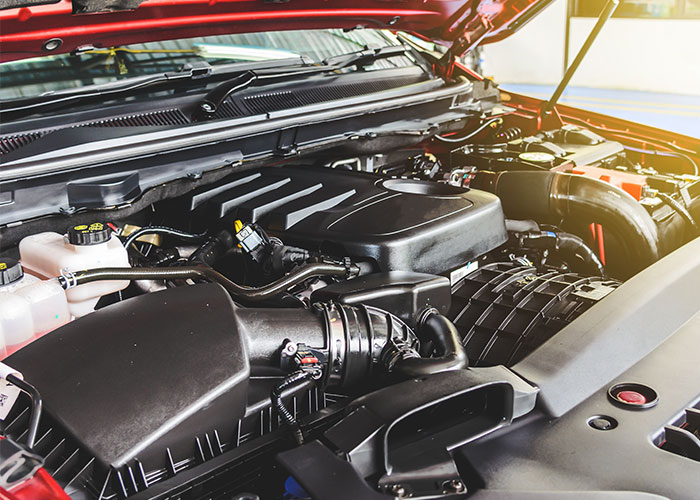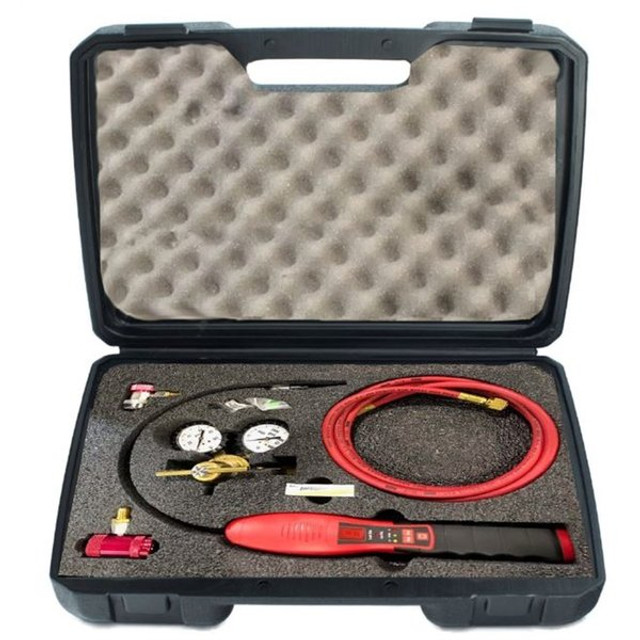How Does A Gas Leak Detector Work?
28th Mar 2024
Car AC systems develop leaks over time, causing discomfort and safety risks. A gas leak detector, specifically designed for this purpose, is crucial in identifying these leaks early. Devices utilizing a nitrogen and hydrogen gas mix are particularly noted for their precision and efficiency.
These air conditioning leak detection systems are engineered to sense the presence of refrigerant gas in the air, a common issue in car AC systems. The integration of nitrogen and hydrogen in some detectors significantly boosts their sensitivity, enabling them to detect leaks that are otherwise hard to find. This feature is particularly vital for maintaining the performance and safety of car AC systems.
In this blog, we’ll delve into the workings of a gas leak detector, focusing on detectors using a nitrogen/hydrogen gas blend for identifying car AC leaks. Let’s start by understanding the types of gas leak detectors.
Types of Gas Leak Detector
FJC Hydrogen Gas Leak Detector
There are several types of gas leak detectors available, including electronic, ultrasonic, and infrared detectors. Each has its unique method of identifying leaks, from detecting sound waves to measuring gas concentrations. However, hydrogen gas leak detectors stand out for their ability to detect minor leaks by sensing hydrogen in a nitrogen/hydrogen mix, ensuring precise air conditioning leak detection.
Hydrogen gas leak detectors, valued for their sensitivity and accuracy, are ideal for detecting elusive car AC leaks, including freon escapes. The advantages of using a hydrogen gas leak detector for air conditioning leak detection are undeniable. They locate leaks faster and minimize the risk of overlooking small leaks that could escalate into more significant problems.
How Hydrogen Gas Leak Detector Work?
Hydrogen gas leak detectors utilize advanced sensor technology that is highly sensitive to hydrogen/nitrogen gas. This sensitivity is crucial when using a nitrogen/hydrogen mix as a tracer gas in air conditioning systems. The mix creates a unique detection environment, crucial for early leak detection in car AC systems.
The detector draws air from around the AC system into its sensor chamber. The sensor reacts to the hydrogen molecules present as the air is processed. This primarily electrical reaction changes the sensor's surface conductivity or resistance.
This change in electrical properties triggers an alarm or visual signal from the detector. The system quantifies this change, comparing it to baseline levels to accurately determine if a leak exists. Nitrogen in the mix acts as an inert background, ensuring the sensor primarily responds to hydrogen.
Such specificity and sensitivity allow hydrogen gas leak detectors to identify even minor car ac leak freon effectively. This capability is invaluable in maintaining the performance and safety of car AC systems, highlighting the importance of this technology in automotive maintenance.
How to Use A Hydrogen Gas Leak Detector?
Efficient use of a hydrogen gas leak detector is critical for identifying leaks in car AC systems. Technicians can ensure accurate air conditioning leak detection by following a structured approach. Below are the easy steps to use a hydrogen gas leak detector:
Set Up The Detector
Before use, ensure the hydrogen gas leak detector is calibrated, and the battery is fully charged. Calibration is crucial for accurate detection. Turn on the device and allow it to warm up if necessary, following the manufacturer's instructions.
Inspect The Area
Inspect the car AC system for signs of obvious damage or wear. This initial check can help focus the detection process. Use the hydrogen gas leak detector to scan the area slowly, particularly connections and joints.
Adjust The Sensitivity
Adjust the detector's sensitivity based on the environment. A higher sensitivity in confined spaces may help identify car AC leak faster. However, reducing sensitivity can prevent false alarms caused by background hydrogen in open or ventilated areas.
Identifying and Mark Leaks
When the detector signals a leak, mark the spot for further inspection. Investigating each alert is essential to determine the leak's exact source. Sometimes, multiple passes may be needed to pinpoint the precise location of an air conditioning leak.
Buy The Best Gas Leak Detectors At JB Tools
JB Tools offers a premier selection of reliable gas leak detectors, including the highly recommended FJC brand, for professionals and DIY enthusiasts. FJC's range of gas leak detectors is known for their precision and durability, making them a top choice for detecting car AC leaks.
Trust JB Tools for your air conditioning leak detection tools, where you can find the best deals to ensure your vehicle's safety and performance.



